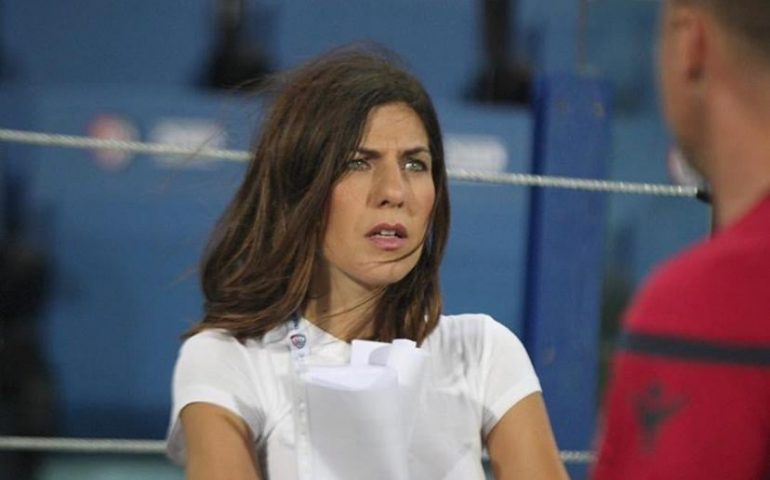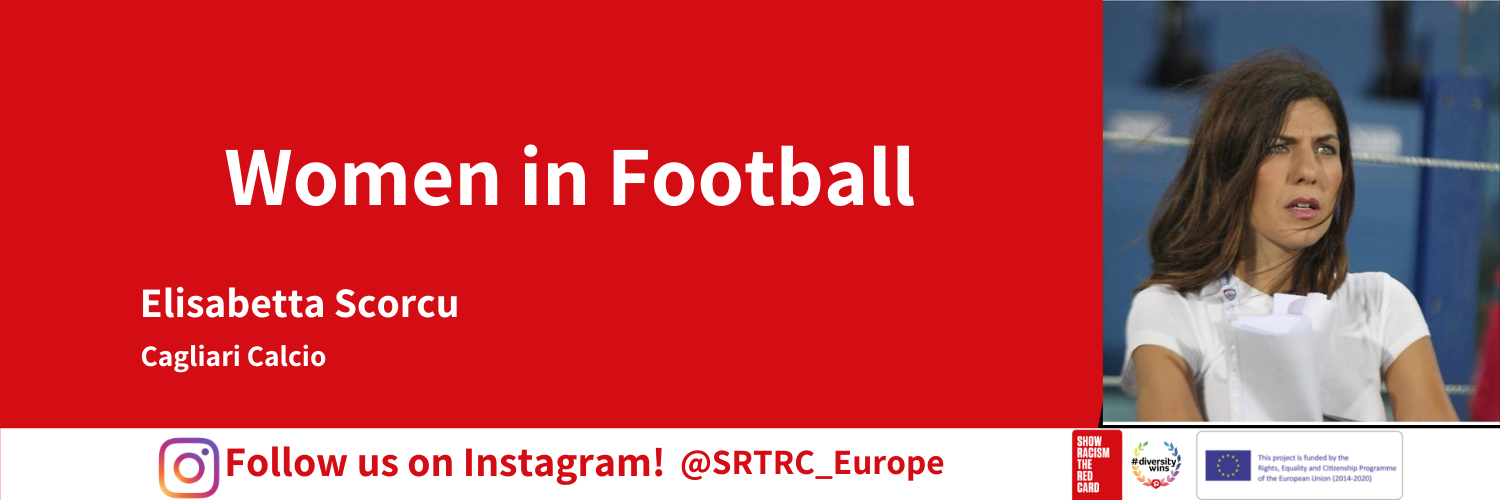Elisabetta Scorcu from Cagliari Calcio
This interview features Elisabetta Scorcu, who is the SLO and CSR responsible at the Italian football club Cagliari Calcio. The interview is part of our Women in Football campaign, which focuses on creating visibility for women working in the football industry. Click here for the Italian version (original).

- What is a day like in your role? What do you like the most about working in football?
I like to think and talk about a very normal day at work, especially one with no major differences from those of a man. I think it’s appropriate to get out of a dichotomous vision, in which a woman has to do certain things, can do some and others can’t. Cagliari Calcio is structured with men and women working side by side in the various sectors, from communication to administration to the general management of events and club dynamics.
My role is made up of meetings, hopefully, more and more in person because that’s what I love, dealing with people, fans, partners during events and initiatives of various kinds. I like to organize, to confront myself with colleagues in order to arrive at a quality result for Cagliari, which can be appreciated internally and externally. In terms of a typical day, beyond the specifics of my job position which looks at events, CSR, and relations with the fans, I think the differences arise when we talk about life outside of work when for example a woman has children and family for whom she has to organize and reconcile commitments?
- Was it difficult for you to make your way in football?
As I mentioned earlier, I am fortunate to work in an environment that is not influenced by gender distinctions. You are capable of what you are worth regardless of whether you are a man or a woman.
However, it is true that on the other side you are faced with a series of clichés, which start out mainly from the idea of soccer as a “world for men made by men”. It took time, as with all social “battles” that are fought to achieve something normal.
- Did you have any (female) role models when you were younger?
Yes, and not from the world of sports. I’m talking about Nilde Iotti, a person of high moral and professional values, a woman who with her spirit, her wide-ranging knowledge and desire to fight for rights and improvement of society has traced a fundamental furrow for everyone, women and men. In general, I love people who have the ability to determine positively, to set an example by doing their job, to teach something in everyday life by doing something tangible. Again, women or men.
- Which advice would you give to a girl that would like to work in football?
To believe in and pursue your passion. Studying, documenting, attending the sector and everything that can lead to having contacts and sharing with those who can teach you something and give you an opportunity.
Working in football means many things, there are many roles and paths, and I am convinced that they can increase. Of course, it is useless to deny it, you have to be ready to fight against prejudices and male chauvinism, which unfortunately has to be defeated and on which there is still a lot to do. But I am optimistic, and I think that a lot has been done and is being done, but we must all continue together, we women together with men who think in the right way and not with a closed mind stuck in the past.
- What was the biggest challenge that you face during your career?
Understand that you have to go beyond the result. You learn when you lose and build when you win. This one we work in is a world strongly conditioned by the result, you learn with time that you have to leave emotion behind and be rational to get to the goal.
Italian (original)
- Com’è una giornata nel tuo ruolo? Cosa ti piace di più del lavoro nel calcio?
Mi piace pensare e parlare di una giornata di lavoro molto normale, soprattutto senza differenze sostanziali da quelle di un uomo. Penso sia opportuno uscire da una visione dicotomica, nella quale una donna debba fare determinate cose, possa farne alcune e altre no. Il Cagliari Calcio è strutturato con uomini e donne che lavorano fianco a fianco nei vari settori, dalla comunicazione all’amministrazione fino alla gestione generale di eventi e dinamiche del club.
Il mio ruolo è fatto di incontri, speriamo sempre più nuovamente di persona perché è ciò che amo, relazionarsi con le persone, i tifosi, i partner in occasione di eventi e iniziative di vario tipo. Mi piace organizzare, confrontarmi con i colleghi per arrivare ad un risultato di qualità per il Cagliari, che possa essere apprezzato internamente ed esternamente. A proposito della giornata tipo, al di là delle specifiche della mia posizione lavorativa che guarda a eventi, CSR e rapporti con la tifoseria, penso che le differenze sorgano nel momento in cui si parla di vita fuori dal mondo del lavoro, allorché per esempio una donna abbia figli e famiglia per i quali dover organizzare e conciliare gli impegni
2. È stato difficile per te farti strada nel calcio?
Original: Come dicevo prima, ho la fortuna di lavorare in un ambiente che non viene influenzato da distinzioni di genere. Sei capace per quello che vali indipendentemente dal fatto che sia uomo o donna. È comunque vero che dall’altra parte ti trovi ad affrontare una serie di luoghi comuni, che partono soprattutto dall’idea del calcio come “mondo per uomini fatto da uomini”. È servito del tempo, come per tutte le “battaglie” sociali che si combattono per ottenere qualcosa di normale.
3. Avevi dei modelli di ruolo (femminili) quando eri più giovane?
Si e non è del mondo dello sport. Parlo di Nilde Iotti, persona di alti valori morali e professionali, una donna che con il suo spirito, le sue conoscenze ad ampio raggio e la voglia di lottare per diritti e miglioramento della società ha tracciato un solco fondamentale per tutti, donne e uomini. In generale amo le persone che hanno capacità di determinare in positivo, di dare un esempio svolgendo la propria mansione, di insegnare qualcosa nel quotidiano facendo qualcosa di tangibile. Anche qui, donne o uomini che siano.
4. Che consiglio daresti a una ragazza che vorrebbe lavorare nel calcio?
Di crederci e inseguire la propria passione. Studiare, documentarsi, frequentare il settore e tutto ciò che possa portare ad avere contatti e condivisione con chi può insegnarti qualcosa e darti una opportunità. Lavorare nel calcio vuol dire tante cose, ci sono tanti ruoli e strade e sono convinta che possano aumentare. Di sicuro, inutile negarlo, bisogna anche essere pronte a lottare contro pregiudizi e maschilismo, che purtroppo va sconfitto e sul quale c’è ancora molto da fare. Ma sono ottimista e penso che tanto si sia fatto e si stia facendo, ma dobbiamo continuare tutti insieme, noi donne insieme agli uomini che ragionano nel modo giusto e non con la mente chiusa ferma al passato.
5. Qual è stata la sfida più grande che hai dovuto affrontare durante la tua carriera?
Capire che si deveandareoltreilrisultato: si imparaquando si perde e si costruiscequando si vince. Questo in cui lavoriamo è un mondo fortementecondizionatodalrisultato, impari con il tempo che devilasciarel’emotivitàedessererazionale per arrivareall’obiettivo.
You can find the overview with all role models here.


